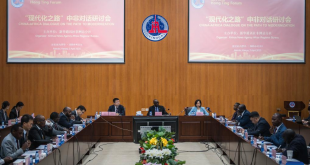Published: December 22,2022
By Gert Grobler

WANG YIMENG/FOR CHINA DAILY
China is delivering real outcomes in the continent based on mutual respect, equality, shared benefits and a win-win approach
US President Joe Biden hosted leaders from across the African continent in Washington during the US-Africa Leaders Summit from Dec 13 to 15. According to the US government, the summit served as an example of the Biden administration’s “commitment to the African continent and provides a forum for new joint initiatives between the United States and countries in Africa”.
In fact, President Biden invited 50 of the 54 African leaders excluding Mali, Burkina Faso, Sudan and Guinea. The US justified this saying that these countries were not invited due to the fact that their African Union membership had been suspended.
The summit can be seen in the background of the recent launch of the US Strategy Toward Sub-Saharan Africa, as well as the US National Security Strategy. These strategies are clearly aimed at resetting US relations with its African counterparts and to advance US’ strategic objectives.
After the near “zero interest in Africa” during the Donald Trump era, the challenge to “reposition” US-Africa relations in a changing global landscape would require a more sincere and good faith engagement on the issues decisive to the continent’s future. The fact is that under both the Trump and Biden administrations, the US has at best made half-hearted attempts to develop its ties with Africa.
Africa would not like to see a repeat of the US-Africa summit that former president Barack Obama convened in Washington in August 2014, the outcome of which was received in a luke-warm fashion across Africa. Apart from falling short on concrete economic, development and transformative measures, many voices across Africa saw the 2014 summit as one intended to counter China’s increasing importance and expanding cooperation with Africa.
From the program of the US-Africa Leaders Summit, it is encouraging to note that the US is now trying to address some of the concerns of Africa. However, the US does not view the continent holistically and its approach in the past did not represent a “comprehensive all-encompassing Africa strategy”.
What Africa would like to see from the Biden administration is a clear, comprehensive bipartisan long-term vision for its US-Africa policy, aligning its engagement with Africa’s stated priorities as outlined in the African Union’s Agenda 2063. An important aspect of the summit would be a tangible plan and agreement on joint actions by the parties involved, including resources — financial, human and institutional — necessary to implement the actions.
Probably anticipating the concerns of Africa, the US included a wide-ranging number of topics on the summit’s agenda, including “hard” themes such as fostering new economic engagement; mitigating the impact of COVID-19 and of future pandemics; working collaboratively to strengthen regional and global health; promoting food security; advancing peace and security and effectively responding to the climate crisis. The US, however, would also like to see the summit build cooperation on “soft power” themes such as sharing values to reinforce commitment to democracy and human rights, promoting civil society, amplifying diaspora ties and the promotion of education and youth leadership.
What remains distressing to Africa is the fact that both the US Strategy Toward Sub-Saharan Africa as well as the US National Security Strategy are premised on the counterproductive and senseless approach by the US of positioning itself in a power competition with China and Russia for influence in Africa. The US National Security Strategy in particular attempts, in a nonsensical manner, to “decouple” the US and China by stating that the US “will prioritize maintaining an enduring competitive edge over the PRC”.
With a new African Continental Free Trade Area uniting 54 nations into the world’s largest trade bloc, a burgeoning population set to double by 2050, and the AfCFTA set to grow Africa’s GDP by about $450 billion, the commercial imperative to engage with Africa has never been clearer. Despite Africa’s tremendous economic potential, the US has lost substantial ground to traditional and emerging partners, especially China.
China surpassed the US as Africa’s largest trade partner as long ago as in 2009, with total bilateral trade reaching more than $254 billion in 2021, a 35 percent rise on 2020 with US trade with the continent remaining impressively low at $64 billion in 2021.
In the face of challenges such as the US’ broken economic promises, lack of required commitment and whether the “US is really back” as promised by President Biden, China-Africa cooperation, in contrast, has over the last few decades made significant joint progress. With China’s comprehensive approach, closely aligned to Africa’s development priorities, the Forum on China-Africa Cooperation and the Belt and Road Initiative continue to deliver concrete benefits to African countries among others regarding continental integration, infrastructure development, strengthened economic links, modernization as well as poverty reduction.
What Africa particularly appreciates is the fact that China seeks to deliver real outcomes in conducting cooperation with the continent based on the principles of mutual respect, equality, extensive consultation, joint contribution, shared benefits and a win-win approach, elements of which are clearly missing in Africa-US relations.
China and Africa cooperation, through platforms such as the FOCAC and the Belt and Road Initiative, has thus effectively contributed to the transformation of the long-standing traditional friendship and solidarity between China and Africa into a multi-sectorial, concrete, measurable and mutually beneficial relationship which continues to flourish.
China-Africa friendship has entered a new era of cooperation, embracing broader strategic and more diversified, but yet, focused prospects and opportunities for common development toward the building of a China and Africa community with a shared future.
The author is a senior research fellow at the Institute of African Studies at Zhejiang Normal University and a former senior diplomat in the South African Department of International Relations and Cooperation.
 Africa -China Review Africa -China Cooperation and Transformation
Africa -China Review Africa -China Cooperation and Transformation
